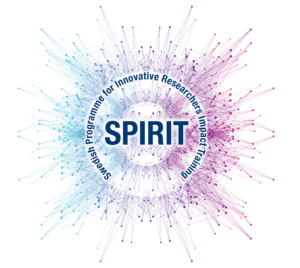Two years ago, Maplebloom conducted a national pre-study exploring how Sweden could better support researchers in bridging the gap between the lab and society. Inspired by international programs like I-Corps (US) and ICURe (UK), we developed a concept tailored to the Swedish context – with added emphasis on ecosystem engagement and societal impact.

The pre-study was funded by Vinnova and evolved into the development of SPiRiT – the Swedish Programme for Innovative Researchers’ Impact Training – co-created with a dedicated team of representatives from Chalmers, KTH, BTH, Lund, and Luleå University of Technology: Fredrik Edman, Kennet Henningsson, Anne Alsholm, Mathias Gaunitz, Eva Halén, Johan Bergström, Kent Mrozek, and project lead Carina Jenslid.
We were also fortunate to receive invaluable support from Sarah Stable from SETsquared and Kieran Fegan from Vara, who generously shared their insights, experience, and provided coaching throughout the process.
The pilot was launched in winter 2024/25. Over the course of eight weeks (with a holiday break), 10 bold teams took on the challenge of conducting up to 80 interviews with external stakeholders around the world.
We’re now in the final phase of compiling the full evaluation of the pilot. Some initial key takeaways:
- Shift in perspective: Researchers reported moving from academic isolation to a clearer understanding of how their research could be applied and create value outside academia – and how to take concrete steps toward societal impact.
- Acquired resources: All teams expanded their networks; many initiated collaborations, received support or materials from industry, and several signed pilot agreements.
- Career impact: Participation opened up new career paths and possibilities – some researchers moved closer to industry or entrepreneurship, while others found renewed motivation for societally engaged academic work.
- Personal transformation: Many described growth in confidence, communication, and leadership – often calling the experience transformative.
Some quotes from the program’s participants:
Before, I saw myself as someone who does lab work and publishes. Now I feel like someone who can also drive change. I have tools to talk to stakeholders, to think strategically, and to make impact. It’s not just science – it’s about real-world value.
In academia, we often create problems just to publish. But this programme helped me shift toward focusing on real problems that matter – problems that can help industry, society, the environment.
We connected with several companies, and some collaborations are already ongoing. Others are not active yet, but the groundwork is in place. I’d say two cooperations are definite, and around three more are possible.
Yeah, I think the program was great actually. I really liked it. I learned a lot from it. Not only about the project but also about myself – how I think, how I present ideas, and how I understand impact.
By testing SPiRiT, we’ve seen what structured, early support for research impact can unlock.
Yet we have only just begun to see the results. It’s too early to assess long-term effects, but this pilot has offered a meaningful first glimpse of what is possible.
We hope that SPiRiT can contribute to a future where engagement beyond the university walls is not the exception, but the norm. Where collaboration with industry and society is valued, supported, and expected. Where research remains free and curiosity-driven, yet open to dialogue with society—so that new knowledge has the opportunity to contribute where it’s needed most.
While SPiRiT is just one initiative among many, we believe it can contribute meaningfully to a shift toward a more impact-oriented research culture.
Image below is for illustrative purposes only (source: Pixabay).



